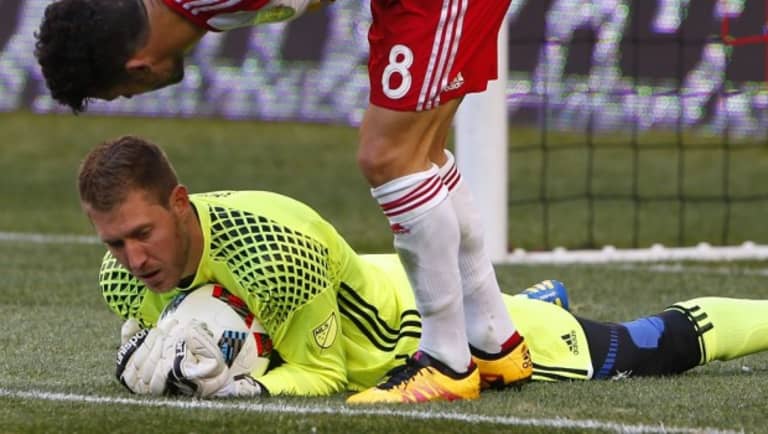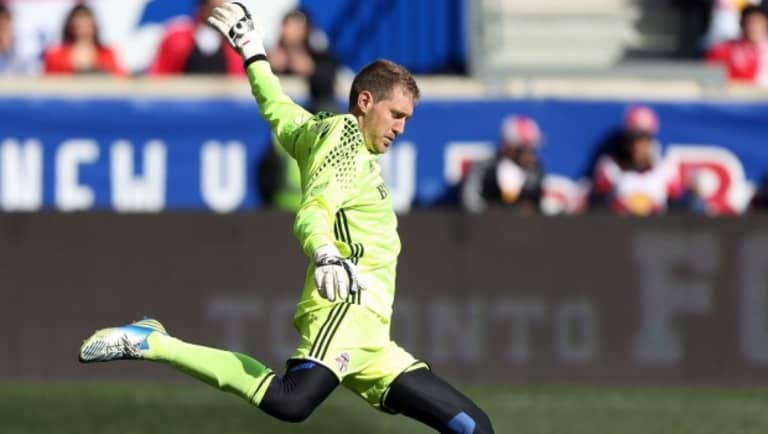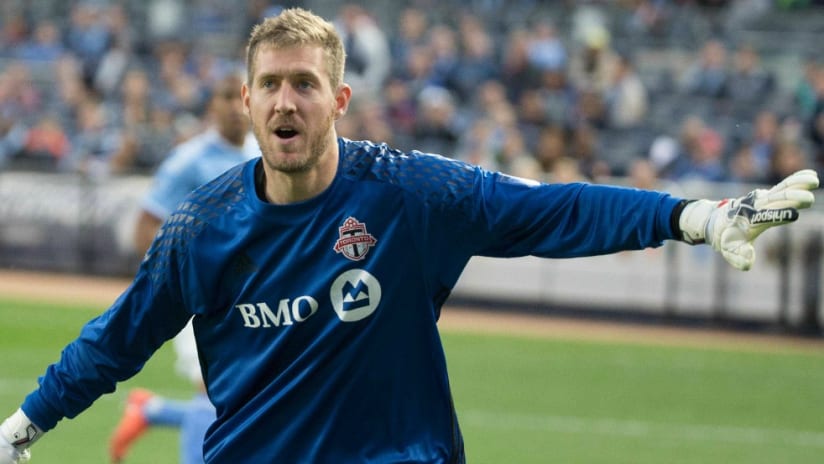Toronto FC goalkeeper Clint Irwin will make a homecoming of sorts this weekend when his new club visits the Colorado Rapids (8 pm ET, TSN, MLS Live). Irwin spent three seasons with the Rapids, becoming one of Colorado’s rare bright spots during some lean years.
During that time, Irwin also became a fan favorite. His actions on the field certainly earned him that reputation, but it was what he did with his time off the pitch that truly set him apart: Irwin sat down at his computer and penned thoughtful, candid pieces about his life as a professional athlete.
During TFC’s preseason stay in Orlando, MLSsoccer.com sat down with Irwin for a wide-ranging conversation. Here it is:
You’re coming to Toronto from Colorado. I think it’s fair to say that, while expectations did exist in Colorado, they were tempered – now you’re at one of the league’s glamour franchises, playing with arguably the best player in league history and a pair of US national team stars. Do you feel the weight of expectations?
I don’t necessarily feel the weight of expectations. I think the expectations are really healthy. It’s one of the things that excited me about the move – you have more attention, there are more people watching. Throughout my career, when the expectations are higher, I’ve always risen to them. They make me a better player. It’s important as a player to embrace those expectations and set goals that are going to exceed those expectations.
You’ve been on the periphery of the national team picture for a while, and there’s been turnover recently in the goalkeeper pool with the USMNT. How much do you think about that as a next step?
It’s always in the back of your mind, [trying to] work your way into that player pool. It’s definitely a goal of mine. I think it can only help when you have very big players on the national team on your own roster. You can learn what it takes to get to that level and lean on them for any sort of guidance that they have. Its another thing that’s excited me about the move -- being around those good players and guys who are getting called up week in and week out to the national team.
I’ve read articles you’ve written and interviews you’ve given where you talk about your leaner days playing lower-division soccer. Your career trajectory has been pretty linear, as opposed to some of these guys who come out of college and are comfortable straight away. How has that shaped your thought process on your success nowadays?
I definitely am more appreciative of the opportunity that’s in front of me now, having been to probably the bottom of the soccer pyramid in North America. I do think it offers some sort of perspective as a player to know that there are players playing here, plying their trade, going through the day in day out just like anyone else but maybe not in the same environment, same training facility that we have up here. It’s a lot different, it makes me appreciative of every opportunity that I got and every opportunity that I have to step out there and play because you never know when you might be going back down the pyramid. It’s kind of a kick in the backside.
Do you miss the struggle?
You don’t necessarily miss the soccer struggle part. But sometimes you miss the camaraderie part of it, when you’re living with seven other guys in a house – those relationships by necessity become close. You bond over those struggles and develop strong friendships. You look back and you still keep in contact with those guys and that’s sort of what binds it all together throughout the course of your careers.

There’s a perception of you, one that certainly you helped create, that you’re a “thinking man’s player.” You’ve written a number of columns for a few different sites, you’re very active on Twitter. Is this a thing where it’s just an interest of yours? Or do you feel the need to speak out for other athletes who maybe don’t write?
It’s a bit of both. I think for one, sometimes Twitter isn’t the best medium to express those longer thoughts. It’s great in some regards, but firing off two or three sentence missives – it doesn’t leave much room for nuance, there’s not much room for discussion or to really delve into things. In that respect, writing a column or an account, however you want to say it, gives you a little bit more room to describe things that you really want to address.
I think, still, the media landscape in Colorado was a little younger – not younger in terms of the age of the reporters but I’d say younger in terms of covering the game. I think a lot of times reporters come up to us and just ask us, “What are you guys working on this week for the game on Saturday” or “What did you think about the game yesterday?” Those are fine questions, but a lot of guys that I know, myself included, we have thoughts on subjects that are maybe outside of just the beat reporter’s questions. Herculez Gomez is a guy I think who’s really thoughtful about a lot of things happening around the game and outside of it.
Why do you think more guys don’t take to writing or maybe expressing their thoughts to the media – is there a fear of public perception, or how that public perception might affect their career?
I’ll speak from my own personal experience. I think you’re seeing it more with the Players' Tribune. I always watch Richard Sherman’s press conferences now because they’ve become an open forum for him to just say whatever he wants to say, which I think is awesome. I think it’s really cool that he takes that opportunity to say what he wants to say rather than have a narrative that’s driven by the people on the other side asking him questions. But I think, from my personal experience, in this league as a player you represent so many different things. You have to be so aware of what you’re saying.
As a player you represent yourself, your family, the club you’re employed by. The club is owned by an ownership group, the club is part of MLS so you represent MLS. If you play for the national team, or have a desire to, you represent US Soccer. If you have sponsors or endorsements, you represent them. There’s a lot at stake and a lot of interests; you almost have to tread very lightly in terms of keeping people happy and keeping the people who are paying you happy. Very few players are in that position where they can say whatever they want without repercussions.
Do you think most clubs in this league would prefer that their players stick to the boilerplate stuff – tough game, could’ve gotten a couple breaks, etc. – and not venture outside of that bubble to speak their mind?
I think it’s a two-way street. I think good questions get good answers. One of the things that is driving me to write more is are the questions that I’m getting. I’ll get asked, “What did you think about the game?” Well, it was a good game, we didn’t get the result, we gotta improve next week. That’s your standard answer. I think most people want to hear more from the athletes. I want to hear more from the other players – what are they thinking? I just don’t think that players are getting that opportunity. Either the expectations are set so low or we’ve just gotten into this routine.
Let’s talk about something less depressing. The election. What do you make of Donald Trump’s rise to political relevance?
It’s almost like a reality show. I’m more of an interested observer than a willing participant. I studied political science in college so I try and take more of a detached view on why these things are happening, not necessarily [opining that] ‘this is terrible, this is awesome.’ It’s definitely interesting for sure. I’ve been trying to figure out for each candidate how things are viewed in Canada. It’s interesting to get the outsider’s perspective.
What do you think [Canadians] make of all of this?
I’m sure they think that [Trump is] a typical American blowhard. But for me, it’s how did we get to this point? What has contributed to the rise of Trump and even [Bernie] Sanders on the other side. People are obviously dissatisfied with Washington [D.C.] in general and how things have played out. Not too many guys in the locker room are just saying things like “Trump is crazy” or “Sanders is a communist or whatever.” It’s more observational.

There’s a perception I think that exists that soccer is more of a progressive sport than some others. Does that hold true in the locker room?
I think you typically know where players stand. Every political engagement that I’ve ever seen in the locker room has been respectful. Ultimately, you’ve gotta see these guys the next day – it’s not like you can get on Twitter and fire off “you’re an idiot” [at your teammate.]
I don’t think it’s any different than the rest of society, which is normally about 50-50. Everyone always asks about “the locker room.” It’s a reflection of society in every way. We have immigrants on our team, foreign guys on our team, we have dyed-in-the-wool Americans on our team, we have Canadians on our team. It helps you get better perspective in terms of where your political leanings might fall, but at the same time it’s always different.
I wonder how much thought you’ve put into what you’d like to do after your playing days end – hopefully later than sooner.
I think about it. Like you said, hopefully it isn’t any time soon. But even while playing in Charlotte, in USL, I’ve worked before. I know what that looks like, I know a little bit of the direction I’d go. I want to be involved with the game. I think the growth of the game is going to lead to a lot more opportunities in terms of jobs, leadership positions. More media, I think. I haven’t really honed in on what exactly – like an exact role – but I know I want to be involved with soccer in some capacity.
You just said, “I’ve worked before.” That’s interesting. I wonder if you think there’s a perception of athletes that they can’t do anything else – that the question isn’t “what would you like to do after you’re done playing,” it’s more “man, what is this guy gonna do after he’s done playing?”
That perception exists. With MLS, I’d say we have the most educated player base out of the major sports because most of our domestic players are going to college. That’s certainly changing, but there is that perception, the perception that right now this isn’t a job, that we go out there and we play a game. In some respects that’s true, but it’s still a job. We have to show up at a certain time, we have expectations that are attached to our job, performance reviews basically. It is a job. It’s just the most fun job you’ll ever have. That’s what I tell young guys. If you’re not having fun out there, I mean – this is the peak level of fun in your work career. You’ll never have a job that you enjoy as much as this.
So you have these other interests – writing, you’re obviously a multi-layered human being. Is it tough to balance that stuff with playing?
It’s more of an outlet. One of the things I’ve learned is that writing certainly isn’t something I see as an actual career, where I have an editor and I crank out [a certain] amount of pieces per week. That doesn’t really give me pleasure in that respect. It’s more so when I have something to say and feel strongly about it, I get on my computer and type something up. And sometimes it’s not even something that I might publish – it’s just something I write to get down and see what it looks like. I think it’s definitely become different for me with all the different things you have to think about as a pro when you’re writing. You realize you don’t have to jump into every single debate or issue or whatever it is, because sometimes it’s just not worth it. Especially on Twitter.














